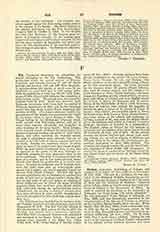

Fischer, ANTONIUS, Archbishop of Cologne and cardinal, b. at Jiilich, May 30, 1840; d. at Neuenahr, July 30, 1912. The son of a professor, he was educated at the Friedrich Wilhelm Gymnasium at Cologne, making his theological studies at the University of Bonn and the Academy of Munster. Ordained priest, September 2, 1863, he was for twenty-five years professor of religion at the Gymnasium at Essen. In 1886 he received his doctorate at the University of Tubingen, his thesis being “De salute infidelium”. He was preconized titular Bishop of Juliopolis, February 14 1889, and was thenceforth associated in the administration of the Diocese of Cologne as assistant to the auxiliary Bishop Baudri, then very old. When Baudri died (June 29, 1893), Fischer succeeded him; in 1901 the See of Cologne became vacant by the death of Msgr. Theophilus Simar, and Fischer was appointed archbishop (November 26, 1902). On June 23? 1903, Pius X made him a cardinal. During the ten years of his episcopate Cardinal Fischer consecrated in several hundred churches and more than one thousand altars. He was a most devoted protector of the religious orders, and the confidence placed in him by the Government was singularly beneficial to the spread of Catholic life. On several occasions during religious or national celebrations he spoke of William II in very warm terms, which caused much comment. Greatly attached to the interests of workingmen, at the Congress of Liege in 1890 he called for the intervention of the State in matters of labor legislation. Addressing himself to the workingmen, he declared “Aspiration towards progress, towards the betterment and preservation of earthly wellbeing is deeply enrooted in human nature and does not contradict the Christian moral laws.” On November 13, 1905, he advised the Catholic miners assembled in Congress at Essen to cooperate with non-Catholic workmen in the discussion of common economic questions. He was likewise the defender with the Holy See of Christian interdenominational syndicates, whose headquarters were at Munchen-Gladbach, and he exerted himself to counterbalance the influences brought to bear in behalf of purely sectarian syndicates by the Catholics of Berlin, the Bishop of Trier, and the Cardinal–Bishop of Breslau.
GEORGES GOYAU

